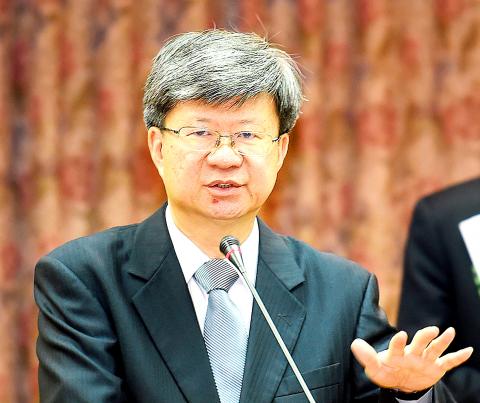Legislators across party lines yesterday questioned the Ministry of Education over what they said was a poor use of the budget for education, contrasting a campus security budget of about NT$65 million (US$2.08 million) with a multibillion-dollar fund for swimming lessons, and urged the ministry to fund the establishment of a campus safety program.
Democratic Progressive Party Legislator Chen Ting-fei (陳亭妃) said the ministry allocated NT$64.96 million for school security, to be shared between more than 3,000 schools nationwide this fiscal year, with each school receiving only about NT$19,000.
The criticism of the ministry’s budget policy comes in the wake of the murder of an eight-year-old girl at the Wenhua Elementary School in Taipei, allegedly by a man who slipped into the campus unseen.

Photo: Fang Pin-chao, Taipei Times
The elementary school has only two security guards on campus and an insufficient number of surveillance cameras, Chen said, adding that schools nationwide are understaffed and ill-equipped because of poor government funding.
She said that President Ma Ying-jeou’s (馬英九) administration launched a 12-year program to promote swimming and water safety in 2010 and earmarked a budget of NT$3.9 billion for the first four years, with annual budgets thereafter to be designated on a yearly basis depending on the needs of local governments.
She called on the ministry to establish a campus security program with funding equivalent to the swimming program.
Some local governments have not allocated a budget for campus security personnel, so it is the central government’s responsibility to maintain campus safety, she said.
Minister of Education Wu Se-hwa (吳思華) said that the ministry and local governments have allocated a portion of the budget for campus security every year, and the ministry is looking into the security plans of each local government to calculate the ministry’s budget in the next fiscal year.
The ministry is trying to draw on a reserve fund allocated for this year, Wu said, adding that upgrading campus security facilities should be prioritized over additional security staffing, which involves modifying the existing system for public schools.
Chinese Nationalist Party (KMT) Legislator Chiang Nai-shin (蔣乃辛) said the government was paying lip service to campus security if it could not redress the shortage of security personnel and the insufficient budget.
He called on the ministry to employ substitute military servicemen to bolster campus security.
In related news, a joint report by the Ministry of Justice, Ministry of the Interior and the Ministry of Health and Welfare was submitted yesterday to the legislature’s Education and Culture Committee, outlining government plans to increase campus security by raising safety awareness among faculty members, fully implementing visitor identification on campus (including taking visitor’s identification cards before entrance, ensuring visitors wear clearly visible badges and notifying teachers of every visit), promoting self-defense skills among students and discouraging students from being alone on campus.
The Ministry of the Interior said that it had ordered police to appoint special personnel to guide every school and establish an emergency call system.
The Ministry of Justice said it had requested prosecutors’ offices to take measures to prevent violence against children.

The manufacture of the remaining 28 M1A2T Abrams tanks Taiwan purchased from the US has recently been completed, and they are expected to be delivered within the next one to two months, a source said yesterday. The Ministry of National Defense is arranging cargo ships to transport the tanks to Taiwan as soon as possible, said the source, who is familiar with the matter. The estimated arrival time ranges from late this month to early next month, the source said. The 28 Abrams tanks make up the third and final batch of a total of 108 tanks, valued at about NT$40.5 billion

Two Taiwanese prosecutors were questioned by Chinese security personnel at their hotel during a trip to China’s Henan Province this month, the Mainland Affairs Council (MAC) said yesterday. The officers had personal information on the prosecutors, including “when they were assigned to their posts, their work locations and job titles,” MAC Deputy Minister and spokesman Liang Wen-chieh (梁文傑) said. On top of asking about their agencies and positions, the officers also questioned the prosecutors about the Cross-Strait Joint Crime-Fighting and Judicial Mutual Assistance Agreement, a pact that serves as the framework for Taiwan-China cooperation on combating crime and providing judicial assistance, Liang

A group from the Taiwanese Designers in Australia association yesterday represented Taiwan at the Midsumma Pride March in Melbourne. The march, held in the St. Kilda suburb, is the city’s largest LGBTQIA+ parade and the flagship event of the annual Midsumma Festival. It attracted more than 45,000 spectators who supported the 400 groups and 10,000 marchers that participated this year, the association said. Taiwanese Designers said they organized a team to march for Taiwan this year, joining politicians, government agencies, professionals and community organizations in showing support for LGBTQIA+ people and diverse communities. As the first country in Asia to legalize same-sex

MOTIVES QUESTIONED The PLA considers Xi’s policies toward Taiwan to be driven by personal considerations rather than military assessment, the Epoch Times reports Chinese President Xi Jinping’s (習近平) latest purge of the Chinese People’s Liberation Army (PLA) leadership might have been prompted by the military’s opposition to plans of invading Taiwan, the Epoch Times said. The Chinese military opposes waging war against Taiwan by a large consensus, putting it at odds with Xi’s vision, the Falun Gong-affiliated daily said in a report on Thursday, citing anonymous sources with insight into the PLA’s inner workings. The opposition is not the opinion of a few generals, but a widely shared view among the PLA cadre, the Epoch Times cited them as saying. “Chinese forces know full well that